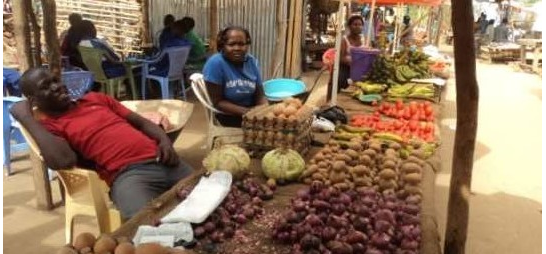SUDAN
Torit citizens fault traders for arbitrarily hiking prices

Traders at a market in Torit [Photo: Gurtong/Peter Lokale Nakimangole]
Citizens in Torit town in Eastern Equatoria State have faulted traders for arbitrarily hiking commodity prices daily which they said impacts them negatively.
Some residents said some unscrupulous traders even hiked prices on an hourly basis while local authorities looked on.
Monday Magdalene Huwaha, a resident of the Odikolong suburb in Torit town, said commodity prices have doubled and that ordinary people can no longer afford necessities.
Previously, 50 kg of maize flour sold at 14,000 but now sells at SSP 27,000, cement was 4,000 but shot up to 7,000, among other essential items.
“Commodity prices have gone beyond the reach of the people and even things which used to cost 100 are now SSP 500. I do not think these prices will come down,” she said. “One of the problems is that of poor roads which makes it difficult to transport local commodities. The authorities should fix the roads then prices will reduce.”
Thomas Obale, a resident of Hai Korton, urged the government to intervene and curb the rising prices in the market saying the grassroots population is suffering.
“Prices have been hiked and I think the government has to find ways of reducing prices because people in the rural areas are suffering because they cannot afford to buy things,” he said.
Meanwhile, Lilly Hidita Nartisio, the chairperson of the chamber of commerce in Eastern Equatoria State, attributed the price hikes to exorbitant taxation at border points and a weak local currency.
“The dollar rate has indeed gone up to 60 and every trader looks at increasing prices but we are calling on them to reduce the prices so that the poor citizens can look after their children,” she said. “Another challenge is that of poor roads which lead to increased costs of transportation. Also, there is taxation which makes traders increase prices.”
Stephen Ihude, the state’s director general for trade, commerce, and industry, admitted that commodity prices, especially for food, had doubled.
“As a government, we have been dialoguing and it is our priority to harmonize taxation,” said. “There are still some cases of multiple taxations but it has now reduced compared to the past and there is a normal adjustment according to the trends in inflation. So, this is what has been done within the state.
No comments:
Post a Comment